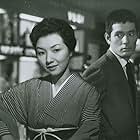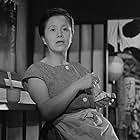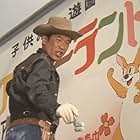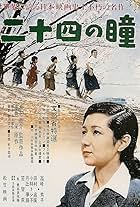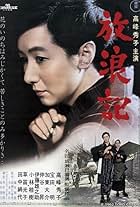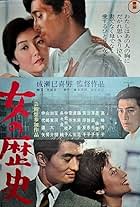IMDb RATING
8.0/10
2.3K
YOUR RATING
After a bombing raid destroys the family store and her husband, Reiko rebuilds and runs the shop out of love stopped short by destruction.After a bombing raid destroys the family store and her husband, Reiko rebuilds and runs the shop out of love stopped short by destruction.After a bombing raid destroys the family store and her husband, Reiko rebuilds and runs the shop out of love stopped short by destruction.
- Director
- Writers
- Stars
- Awards
- 1 win total
- Director
- Writers
- All cast & crew
- Production, box office & more at IMDbPro
Featured reviews
I was really astonished to see so few reviews on such a great movie.
Yearning (A woman in upheaval in its French title, Midareru in Japanese - being disturbed) is a movie that deserves your attention. And not only if you like Japan. Of course, it is really characteristic of Japanese culture at that time and the change that proceeds in this country at that time, beginning to shift from tradition to modernity. But it is also the wonderful tale a the relationship between two people and how the social constraint applies to them. And how this relationship begin to shift (yes, like the country itself, however not in the same way).
Emotion, society, money, this movies addresses a lot of topics but do not forget to follow its story. Helped with a great acting, with a beautiful female lead characer, it is a successful movie in every aspects. Do take your time to enjoy it!
Yearning (A woman in upheaval in its French title, Midareru in Japanese - being disturbed) is a movie that deserves your attention. And not only if you like Japan. Of course, it is really characteristic of Japanese culture at that time and the change that proceeds in this country at that time, beginning to shift from tradition to modernity. But it is also the wonderful tale a the relationship between two people and how the social constraint applies to them. And how this relationship begin to shift (yes, like the country itself, however not in the same way).
Emotion, society, money, this movies addresses a lot of topics but do not forget to follow its story. Helped with a great acting, with a beautiful female lead characer, it is a successful movie in every aspects. Do take your time to enjoy it!
Mikio Naruse's film Yearning reflects the significant social change occurring in Japan in 1964 when supermarkets began to offer cheaper prices in order to drive out the small shops which had dominated the market. This changing structure particularly affects Reiko (Hideko Takamine), a widow since the last war after only being married for six months. She has remained with her husband's family to run the family grocery store along with her mother-in-law Shizu (Aiko Mamasu) while brother-in-law Koji (Yûzô Kayama), and sister-in-laws Hisako (Mitsuko Kusabue) and Takako (Yumi Shirakawa) live their own private lives. Takamine's remarkable performance as the repressed widow conveys a longing for a freedom that has been elusive.
The film opens as a van parades the streets advertising the supermarket, driving past Reiko's store in the process. Shot in Naruse's quiet style, the film is a study in contrasts. Reiko is a woman with traditional values who has repressed her own desire for companionship to serve her husband's family, while Koji is a layabout who drinks and gambles and takes no responsibility for the family business. When a group of drunken businessman pressure bar girls to see how many eggs they can stuff into their mouths, Koji intervenes and starts a fight leaving Reiko to bail him out of jail. Koji and his sisters make plans to build their own supermarket, but conspicuously leave Reiko out of their plans, urging her to remarry.
Reiko is hurt by the family's seeming lack of appreciation for her service. She is accepting of her role, but emotionally unprepared when Koji surprisingly confesses to her that he loves her. Though Reiko initially rejects his advances, she tells him later: "when you said you loved me, I felt glad," and "I've been a different woman since that day." She is unable, however, to accept Koji's telling her that she has wasted her life for his family. Though she hears the words, she is too bound to the past to be able to acknowledge their truth. She tells Koji, "I didn't waste my life. I lived it," but she is not convincing. The entire mood of the film changes with Koji's declaration and the way their relationship unfolds constitutes the emotional core of the film and provides its most dramatic moments and its shattering conclusion.
The film opens as a van parades the streets advertising the supermarket, driving past Reiko's store in the process. Shot in Naruse's quiet style, the film is a study in contrasts. Reiko is a woman with traditional values who has repressed her own desire for companionship to serve her husband's family, while Koji is a layabout who drinks and gambles and takes no responsibility for the family business. When a group of drunken businessman pressure bar girls to see how many eggs they can stuff into their mouths, Koji intervenes and starts a fight leaving Reiko to bail him out of jail. Koji and his sisters make plans to build their own supermarket, but conspicuously leave Reiko out of their plans, urging her to remarry.
Reiko is hurt by the family's seeming lack of appreciation for her service. She is accepting of her role, but emotionally unprepared when Koji surprisingly confesses to her that he loves her. Though Reiko initially rejects his advances, she tells him later: "when you said you loved me, I felt glad," and "I've been a different woman since that day." She is unable, however, to accept Koji's telling her that she has wasted her life for his family. Though she hears the words, she is too bound to the past to be able to acknowledge their truth. She tells Koji, "I didn't waste my life. I lived it," but she is not convincing. The entire mood of the film changes with Koji's declaration and the way their relationship unfolds constitutes the emotional core of the film and provides its most dramatic moments and its shattering conclusion.
I have binge watching Naruse films and have liked all but one. Yearning may be the moving both as a love story and as a story of social change. The theme of small businesses being run out by large corporations is as timely today in the US as it was in 1964 Japan. The two leads are terrific and have great chemistry. Highly recommended
I saw YEARNING (MIDARERU, 1964) at a screening at New York's Asia Society on Dec. 3, 2010. It's only the second film by Mikio Naruse that I've seen, but I'm eager to see more. (The first was WHEN A WOMAN ASCENDS THE STAIRS, 1960, seen on Criterion DVD earlier this year.) YEARNING is a quiet but emotionally honest drama about Reiko, a war widow who has given her best years to her late husband's family, managing their grocery shop while Koji, her younger, handsome brother-in-law, gambles, drinks and loafs. The family plots to tear down the shop and build a supermarket in its place, pushing Reiko out of the top position. Koji protests. When he decides to take a stand, on more than one front, it changes his relationship to Reiko and forces her to make a life-changing decision.
Naruse shoots in a spare, classical style with sync-sound recording, both on location and in the studio, and gets strong performances out of the entire cast. Yuzo Kayama, whom I know primarily from period movies like SANJURO, CHUSHINGURA and SWORD OF DOOM, plays Koji as a spoiled son and brother who begins to mature before our eyes. Hideko Takamine plays the still-beautiful 30-something widow whose self-effacing front hides her own submerged desires. She never acts on her own behalf, but just dutifully runs the shop and waits for Koji to grow up. No matter what is happening in her heart, she simply won't ask for anything or accept it when it's offered. Even when she makes her big move midway through the film, it's only because she thinks it will help Koji. Reiko resembles an Ozu heroine, while Keiko, the lead character in WHEN A WOMAN, also played by Takamine, was more like a Mizoguchi heroine. The film was shot in widescreen black-and-white and the action is set mostly in a small rural town far from Tokyo where a new supermarket loudly promotes itself and its cheaper prices, causing hardship for the small shopkeepers like Reiko. (This is why Koji's family wants to expand the store-to compete.) Later, the film stays with Reiko on a train ride for a long stretch, wrapping up in a small, picturesque resort town.
Mie Hama, the petite beauty who played Kissy Suzuki, the Japanese agent who marries James Bond in YOU ONLY LIVE TWICE (1967), appears in two memorable scenes as Koji's cute and fickle young bedmate who chews gum (and spits it out on the floor of the shop) and boasts a beauty shop hairdo like American teenage girls were wearing at the time. She's quite keyed into her own desires in a way that Reiko can only envy. When she was on screen, I kind of wished the movie would stay with her for a while.
The abrupt ending may leave some viewers unsatisfied. I would have preferred some kind of epilogue, like the final scene of WHEN A WOMAN. However, I've learned to accept that with certain filmmakers like Naruse, one should take the ending on faith, even if you don't get the reason for it right away. YEARNING remains a beautiful, moving Japanese drama with an insistent subtext about the lingering effects of the war on Japanese families some 20 years after the surrender.
Naruse shoots in a spare, classical style with sync-sound recording, both on location and in the studio, and gets strong performances out of the entire cast. Yuzo Kayama, whom I know primarily from period movies like SANJURO, CHUSHINGURA and SWORD OF DOOM, plays Koji as a spoiled son and brother who begins to mature before our eyes. Hideko Takamine plays the still-beautiful 30-something widow whose self-effacing front hides her own submerged desires. She never acts on her own behalf, but just dutifully runs the shop and waits for Koji to grow up. No matter what is happening in her heart, she simply won't ask for anything or accept it when it's offered. Even when she makes her big move midway through the film, it's only because she thinks it will help Koji. Reiko resembles an Ozu heroine, while Keiko, the lead character in WHEN A WOMAN, also played by Takamine, was more like a Mizoguchi heroine. The film was shot in widescreen black-and-white and the action is set mostly in a small rural town far from Tokyo where a new supermarket loudly promotes itself and its cheaper prices, causing hardship for the small shopkeepers like Reiko. (This is why Koji's family wants to expand the store-to compete.) Later, the film stays with Reiko on a train ride for a long stretch, wrapping up in a small, picturesque resort town.
Mie Hama, the petite beauty who played Kissy Suzuki, the Japanese agent who marries James Bond in YOU ONLY LIVE TWICE (1967), appears in two memorable scenes as Koji's cute and fickle young bedmate who chews gum (and spits it out on the floor of the shop) and boasts a beauty shop hairdo like American teenage girls were wearing at the time. She's quite keyed into her own desires in a way that Reiko can only envy. When she was on screen, I kind of wished the movie would stay with her for a while.
The abrupt ending may leave some viewers unsatisfied. I would have preferred some kind of epilogue, like the final scene of WHEN A WOMAN. However, I've learned to accept that with certain filmmakers like Naruse, one should take the ending on faith, even if you don't get the reason for it right away. YEARNING remains a beautiful, moving Japanese drama with an insistent subtext about the lingering effects of the war on Japanese families some 20 years after the surrender.
I have all the respect in the world for Mikio Naruse, I really do. His films always touch on things that are still relevant- he's good at exploring timeless themes. His films always have good acting, and are also always nice to look at. They're also tremendously empathetic, and focus far more on female characters than many films from the 1950s and 60s. In that way, they also feel forward-thinking and maybe even radical.
But at the same time, I do always find them slow-going and a little hard to really get into it. There's a certain distance I feel every time I watch one of his movies, even while I recognise they're very well-made. And there's no proper criticisms I can make about it; not more than saying I just find his films a little boring.
It's a me problem. I still respect what he did as a filmmaker, and I do understand why he's so highly regarded. His movies just aren't really for me - not any I've seen yet, at least.
But at the same time, I do always find them slow-going and a little hard to really get into it. There's a certain distance I feel every time I watch one of his movies, even while I recognise they're very well-made. And there's no proper criticisms I can make about it; not more than saying I just find his films a little boring.
It's a me problem. I still respect what he did as a filmmaker, and I do understand why he's so highly regarded. His movies just aren't really for me - not any I've seen yet, at least.
- How long is Yearning?Powered by Alexa
Details
- Release date
- Country of origin
- Language
- Also known as
- Tormento (Midareru)
- Production company
- See more company credits at IMDbPro
- Runtime1 hour 38 minutes
- Color
- Sound mix
- Aspect ratio
- 2.35 : 1
Contribute to this page
Suggest an edit or add missing content


![Watch Trailer [OV]](https://m.media-amazon.com/images/M/MV5BZGVlZTIxNDUtMjg2NC00Y2VkLTg3MWEtYzZlMmRkNmQ3MmNlXkEyXkFqcGdeQXRyYW5zY29kZS13b3JrZmxvdw@@._V1_QL75_UY281_CR2,0,500,281_.jpg)






